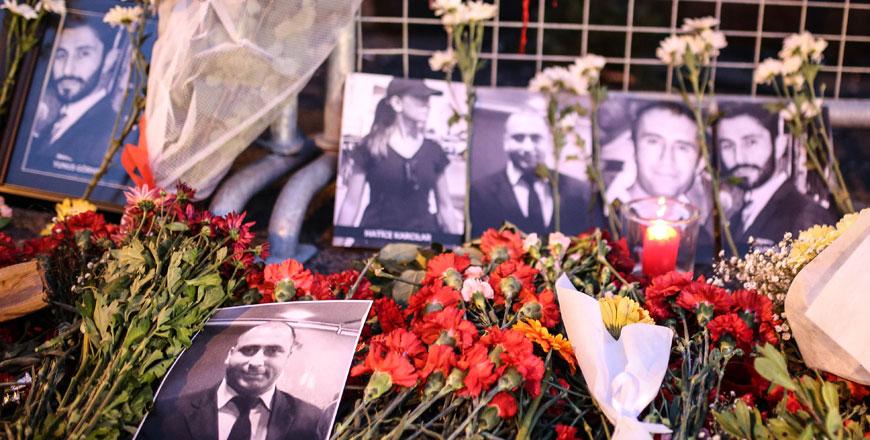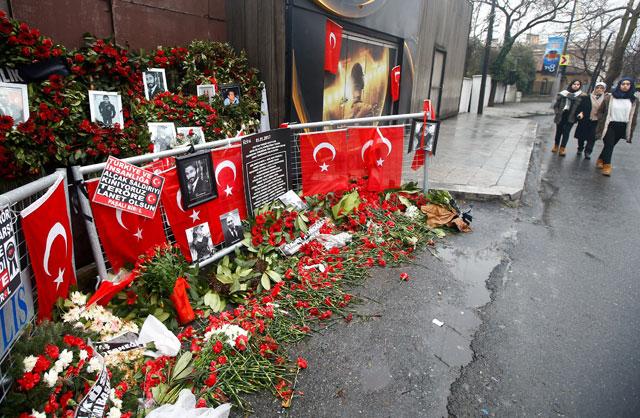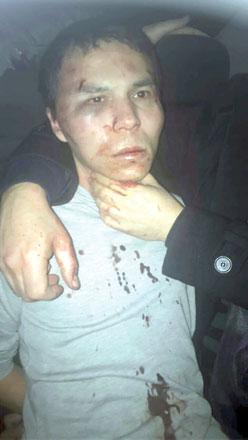You are here
Turkey fixed in Daesh crosshairs after Istanbul attack
By AFP - Jan 03,2017 - Last updated at Jan 03,2017

A man reacts as people march to protest against the attack and in memorial to the victims of the nightclub of New Year's Day attack, in Istanbul, Tuesday (AP photo)
ISTANBUL — Turkey risks encountering a new level of threat on its own territory from the Daesh terror group after the Istanbul nightclub attack, with the group openly targeting the country as Ankara battles the extremists inside Syria.
While Daesh had been blamed for several attacks in Turkey over the last year, the brutal gun attack on the Reina nightclub 75 minutes into 2017 was distinctive in its choice of target and by the clear claim issued by the extremists.
"Daesh has clearly decided to target Turkey," Sinan Ulgen, chairman of the Centre for Economics and Foreign Policy and visiting scholar at Carnegie Europe, told AFP.
"All the stages have been passed and battle commenced."
The attack on the Reina nightclub that killed 39 people struck a symbol of the overwhelmingly Muslim country's secular society, where the Istanbul elite like to party, dance and drink.
It took place in the district of Ortakoy, a traditionally mixed area which to this day has working churches and a synagogue.
It also came on the night of New Year — as calculated by the Gregorian Calendar — which conservative hardliners in Turkey say should not be celebrated at all.
Ozgur Unluhisarcikli, Ankara office director of the German Marshall Fund of the United States, said the attack had sought "to drive another wedge between Turks with secular and conservative lifestyles."
'Firmly in the sights'
But the attack was also unique in that it was claimed by Daesh in a formal statement — the first time the extremists have made a clear and undisputed boast of a major strike in Turkey, despite being blamed on several occasions.
Daesh has in the past claimed individual assassinations of Syrian anti-extremist activists in southern Turkey and there was a disputed claim over a bombing in the southeast in November.
"I think they're trying to make it look like something which is unambiguously centrally-directed, rather than that just carried out by a supporter," said Charlie Winter, senior fellow at the International Centre for the Study of Radicalisation and Political Violence at King's College, London.
He said that over the last months, Turkey has been "firmly in the sights" of Daesh extremists "perhaps more than any other country", with threats repeatedly printed in its so-called magazine Dabiq.
'No magic wand'
The attack came with Turkey deeply entrenched in a military campaign inside Syria aimed at ousting Daesh, as well as Kurdish militia, from the border area that has already lasted four months.
In the early years of the Syrian civil war, Ankara's Western allies accused Turkey of turning a blind eye to or even abetting the rise of Daesh as a useful ally in the battle against President Bashar Assad.
Turkey has vehemently denied such claims, noting it listed Daesh as a terror group since 2013. But the operation has transformed the equation in Ankara's approach to the group, making President Recep Tayyip Erdogan an arch-foe of the extremists.
"The situation changed with the decision by Ankara to launch a military campaign against Daesh," said Ulgen.
After a rapid start to Turkey's Syria operation, progress has stalled at the Daesh-held town of Al Bab, where the Turkish army has sustained its heaviest casualties.
Daesh last month published a video purportedly showing the burning to death of two Turkish troops captured in Syria. Ankara has said three soldiers are held by Daesh in Syria but warned there is no evidence to confirm the authenticity of the video.
Extremists have been blamed for a slew of attacks in Turkey since 2015 including a devastating triple suicide bombing and gun attack at Istanbul's Ataturk airport in June that killed 47.
Related Articles
CAIRO/ISTANBUL — The Daesh terror group claimed responsibility on Monday for a New Year's Eve mass shooting in a packed Istanbul nightclub t
ISTANBUL — The main suspect in a New Year's Day shooting which killed 39 people at an Istanbul nightclub two years ago denied the charges ag
ISTANBUL — A 34-year-old Uzbek man suspected of slaughtering 39 people at an Istanbul nightclub on New Year's Eve confessed to the massacre



















